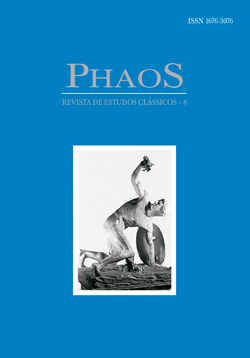Entre a cruz e a espada: tradução e comentário do martírio do soldado Marino
Palavras-chave:
Bios hagiographic genre. Christian literature. Roman Empire. Greek koiné.Resumo
This article presents a translation with commentary of a text written in koiné Greek. The text tells the story of a Christian accused and killed for his faith in the mid-third century A.D., and can be considered an example of the genre bios hagiographic, which was widely utilized by the Christians in the centuries II to IV A.D. The analysis of the linguistic elements - such as the lexicon and the tenses of the verbs – correlated to the social and historical context indicates that Marino is in a personal impasse which reflects a much greater struggle of profound social dimensions: the dispute for power between the church and the Roman state. We verify that the author intentionally contrasts these two powers highlighting the Christian viewpoint.Referências
AALEN, S. τιμή. In: COENEN, Lothar; BROWN, Colin (Orgs.). Dicionário Internacional de Teologia do Novo Testamento, v.1. Tradução Gordon Chown. São Paulo: Vida Nova, 2000.
ALESSO, Marta. Los géneros literarios en el primer cristianismo. Circe de Clásicos y Modernos [online]. 2005-2006, no.10, p.19-36. ISSN 1851-1724. Disponível em: http: . Consultado em 03 Junho 2008.
ARNAULD, Dominique. Histoire du christianisme in Afrique - les sept premier siècles. Paris: Éditions Karthala, 2001.
ARNDT, William F.; GINGRICH, F. Wilbur. A Greek-English of the New Testament and other early Christian literature. 4th revised and augmented edition. Chicago: University of Chicago Press, 1952.
BAIILY, A. Dictionnaire Grec-Français. Paris: Hachette, 1950.
BAKHTIN, Mikhail. Estética da criação verbal. Tradução Paulo Bezerra. 4a.ed. São Paulo: Martins Fontes, 2003.
BERGER, Klaus. As formas literárias do Novo Testamento. Tradução Fredericus Antonius Stein. São Paulo: Edições Loyola, 1998.
BÍBLIA SAGRADA: Nova Versão Internacional. Traduzido pela comissão de tradução da Sociedade Bíblica Internacional. São Paulo: Editora Vida, 2001.
BLASS, F. W.; DEBRUNNER, A. A Greek Grammar of the new testament and other early christian literature. Chicago: University of Chicago Press, 1961.
BOEFT, Jan den; BREMMER, Jan. Notiunculae Martyrologicae II. Vigiliae Christianae, vol.36, no.4, dez. 1982. pp.383-402. http://www.jstor.org/pss/1582845. Acesso: 11/06/2008.
BROWN, Peter. Corpo e sociedade: o homem, a mulher e a renúncia sexual no início do cristianismo. Rio de Janeiro: Jorge Zahar Editor, 1990.
DANIÉLOU, Jean & MARROU, Henri. Nova História da Igreja: dos primórdios a São Gregório Magno. Tradução Dom Frei Paulo Evaristo Arns. Petrópolis: Vozes, 1966.
DANIEL-ROPS. A igreja dos apóstolos e dos mártires. Tradução Emérico da Gama. São Paulo: Quadrante, 1988.
DELEHAYE, Hippolyte. Les passions des martyrs et les genres littéraires. 2a.ed, rev. et corr. Bruxelles: Societé des Bollandistes, 1966.
EUSÉBIO DE CESARÉIA. História Eclesiástica. Tradução Wolfgang Fisher. São Paulo: Fonte Editorial, 2005.
FOX, Robin Lane. Literacy and power in early Christianity. In: BOWMAN, Alan; WOOLF, Greg (Ed.) Literacy and power in the ancient world. Oxford: Cambridge University Press, 1996.
GINGRICH, Wilburg & DANKER, Frederick. Léxico do Novo Testamento Grego-Português. Tradução Júlio P.T. Zabatiero. São Paulo: Vida Nova, 1993.
GONZÁLEZ, Justo L. E até aos confins da Terra: uma história ilustrada do Cristianismo. Vol. 1 – A era dos mártires. Tradução Key Yuasa. São Paulo: Vida Nova, 1995.
GOODWIN, William W. Greek Grammar. Revised and enlarged. Boston: Ginn & Company, 1900.
GUIGNEBERT, Charles. El Cristianismo antiguo. Tradução Nelida Orfila Reynal. Mexico: Fondo de Cultura Econômica, 1956.
IPIRANGA JÚNIOR, Pedro. Biografia e romance na Antigüidade: fronteiras, entrecruzamentos e hibridismos. Projeto de pesquisa. Curitiba: Universidade Federal do Paraná, 2006, inédito.
IPIRANGA JÚNIOR, Pedro. O outro como em si mesmo: martírio e cristianismo. Conferência proferida na Universidade Federal do Ceará, 2007.
LAMPE, Geoffrey W.H. A Patristic greek lexicon. Oxford: Clarenton Press, 2000.
LASOR, William S. Gramática Sintática do Grego do Novo Testamento. Tradução Rubens Paes. São Paulo: Vida Nova, 1973.
LIDDELL, H.; SCOTT, R. Greek-English Lexicon Abridged. Simon Wallenberg Press, 2007.
MEREDITH, Anthony. Ascetism – Christian and Greek. In: Journal of Theological Studies, N.S., v.XXVII, pt.2, Oxford, 1976, p.313-332.
MOMIGLIANO, Arnaldo. Les origines de la biographie en Grèce ancienne. Traduit de l’anglais par Estelle Oudot. Strasbourg: Circe, 1971.
MOMIGLIANO, Arnaldo. Os limites da helenização: a interação cultural das civilizações grega, romana, céltica, judaica e persa. Tradução Claudia Martinelli Gama. Rio de Janeiro: Jorge Zahar, 1991.
MORESCHINI, Cláudio & NORELLI, Enrico. História da literatura cristã antiga grega e latina. Vol 1 – de Paulo à Era Constantiniana. Tradução Marcos Bagno. São Paulo: Edições Loyola, 2000.
MOULTON, James Hope. New lights on Biblical Greek. The Biblical World. Vol.19, no. 3, mar.1902, pp.190-196.
MUSURILLO, Herbert. Acts of the Christian Martyrs (v.II). Oxford: Oxford University Press, 2000.
PUECH, Aimé. Histoire de la littérature grecque chrétienne, tome III. Paris: Les Belles Lettres, 1930.
SILVA, Gilvan Ventura da. A relação Estado/Igreja no Império Romano (séculos III e IV). In: SILVA, Gilvan; MENDES, Norma (Org.). Repensando o Império Romano: perspectiva socioeconômica, política e cultural. Vitória: EDUFES, 2006. p. 241-266.
SMYTH, Herbert Weir. A Greek Grammar for Colleges. http://www.perseus.tufts.edu/
SOPHOCLES, E.A. Greek lexicon of the Roman and Byzantine Periods from B.C. 146 to A.D. 1100 – part one. New York: Charles Scribner’s Sons, 1900.
TERTULIANO. Os Espectáculos (De spectaculis). Tradução João Maia. Lisboa; São Paulo: Verbo, 1974.
UYTFANGHE, Marc Van. L’Hagiografie un “genre” chrétien ou antique tardif? In: Analecta Bollandiana (Revue Critique d’Hagiografie). Bruxelles: Societé des Bollandistes, 1993 (Tome 111).
Downloads
Publicado
Edição
Seção
Licença
Ao se submeterem textos para a PhaoS, seus autores devem estar cientes de que, se aprovados para publicação, a revista terá sobre eles todos os direitos autorais pertinentes. Originais não serão devolvidos.

